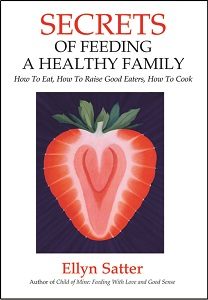

Family Meals Focus
The Ellyn Satter Institute Newsletter
Pregnancy weight gain
by Ellyn Satter, Registered Dietitian and Family Therapist
In Secrets of Feeding a Healthy Family, I observed that ”Until we recover eating as one of life’s great pleasures, it simply is not going to turn out well.” Nowhere is that more apparent than when we consider current pressure to restrict food intake and limit weight gain during pregnancy. Such pressure does far more harm than good.
We have restricted pregnancy weight gain in the past
Back in the sixties, when I started my dietetics career in an private outpatient medical group practice, obstetricians were vehement about combating what they viewed as excessive weight gain during pregnancy. Their rigid guidelines allowed women whose weights were judged to be normal to gain 15 lb; those judged overweight were told to gain none. Doctors were absolutely convinced of the rightness of these guidelines, based on their clinical impressions (contradicted by numerous research studies then available) that excessive weight gain caused preeclampsia and difficult delivery. Women were shamed and scolded, and one of doctors even threatened not to deliver his patients if they gained too much weight. Women worried constantly about eating and weight and dreaded their prenatal appointments. Most tried to go hungry all month and many stopped eating and even drinking on the day prior to weigh-in. In short, many perfectly happy pregnancies were spoiled by obsession with eating and weight gain.
Weight gain guidelines were liberalized in the 1970s
That all changed with the 1970 National Research Council statement,1 which encouraged, and supported with persuasive clinical outcome data, letting women eat as much as they were hungry for and gaining weight accordingly during pregnancy. The monograph predicted a weight gain of 20 to 25 lb and correlated this natural weight gain with the best outcome for both mother and child. In response to that report, we began encouraging our patients to eat in accordance with their hunger, appetite and satiety. Women gained more weight than before, and we supported it (with the exception of one nurse who persisted in sucking in her breath when patients gained and praising them when they failed to).
Research from a medical practice
The theme of this series is ”don’t try to outsmart Mother Nature.” Supporting mothers in eating as much as they need and accepting their weight gain has the best chance of producing a healthy baby.
Three years later, our clinical research showed that our patients before 1970 gained, on the average, eight pounds less than those after 1970, 15.9 versus 24.2 pounds. Babies born to mothers who gained more weight were heavier by 159 grams – over five ounces. There were six mothers before 1970 who gained less than ten pounds, and their babies weighed over 11 ounces less than the average babies.2 The five-ounce weight difference between the pre-1970 and post-1970 babies doesn’t sound like much, and neither group had low birth weights. To understand the practical significance of this difference, consider that infants born after the extremely short rations of the WWII Rotterdam blockade were 300 g. (10 oz) smaller than average.3 Infants of our advantaged mothers showed half the weight deficit of infants of starved Rotterdam mothers!
Maternal weight gain doesn’t predict birth size
The moral of the story is not, however, that low weight gain will produce a small baby, high gain a big baby. While the trends existed in our population and in other studies, we can’t predict for individuals. According to the Institute of Medicine, which published the current recommendations on nutrition during pregnancy, ”The low birth weight of an infant born to a mother who gained only 11 lb. cannot be a confidently attributed to her low gestational weight gain, nor can the high birth weight of a baby whose mother gained 55 lb be attributed to high gestational weight gain.”4
The bad old days are coming back
Unfortunately, those bad-old-days attitudes about restricting weight gain during pregnancy are coming back. Now health and nutrition policy, medical practice, and societal vehemence about weight exert the very pressures on weight gain during pregnancy that came from those pre-1970 norms in obstetrical practice. Current concern is focused around high obstetrical weight gains, particularly those of women considered to be overweight, delivering a large baby – one who by definition weighs 9.9 lb or more, or increasing post-pregnancy weight retention in the mother and the fetus.5
Don’t try to outsmart Mother Nature
The next four newsletters will address the dilemmas. negative consequences, and erosion of nutritional behavior that weight restriction create for pregnant women, and proposes a sensible and non-harmful prenatal eating management. The series wraps up by addressing infant birth weight and lifetime health patterns. The theme of this series is ”don’t try to outsmart Mother Nature.” Supporting mothers in eating as much as they need and accepting their weight gain has the best chance of producing a healthy baby.
References
1. Committee on Maternal Nutrition F&NB. Maternal Nutrition and the Course of Pregnancy. Washington, DC: National Research Council; 1970.
2. Gormican A, Satter EM, Valentine J. Relationships of maternal weight gain, pre-pregnancy weight, and infant birth-weight. J Am Diet Assoc. 1980;77:662-667.
3. Stein Z, Susser M. The Dutch famine, 1944-1945, and the reproductive process. II. Interrelations of caloric rations and six indices at birth. Pediatr Res. 1975;9:76-83.
4. Food and Nutrition Board IoM. Nutrition During Pregnancy. Washington, D.C.: National Academy Press; 1990.
5. Abrams B, Altman SL, Pickett KE. Pregnancy weight gain: still controversial. Am J Clin Nutr. 2000;71:1233S-41S.
Explore
Understand and Apply ecSatter
Ellyn Satter’s Secrets of Feeding a Healthy Family says the secret of raising a healthy eater is to love good food, enjoy eating, and share that love and enjoyment with your child. When the joy goes out of eating, nutrition suffers.
Read the series on weight gain in pregnancy!
- Pregnancy: 1 Weight gain
- Pregnancy: 2 The weight dilemma
- Pregnancy: 3 Weight restriction, harming without helping
- Pregnancy: 4 The joy of eating
- Pregnancy: 5 Weight gain won’t make your baby fat

